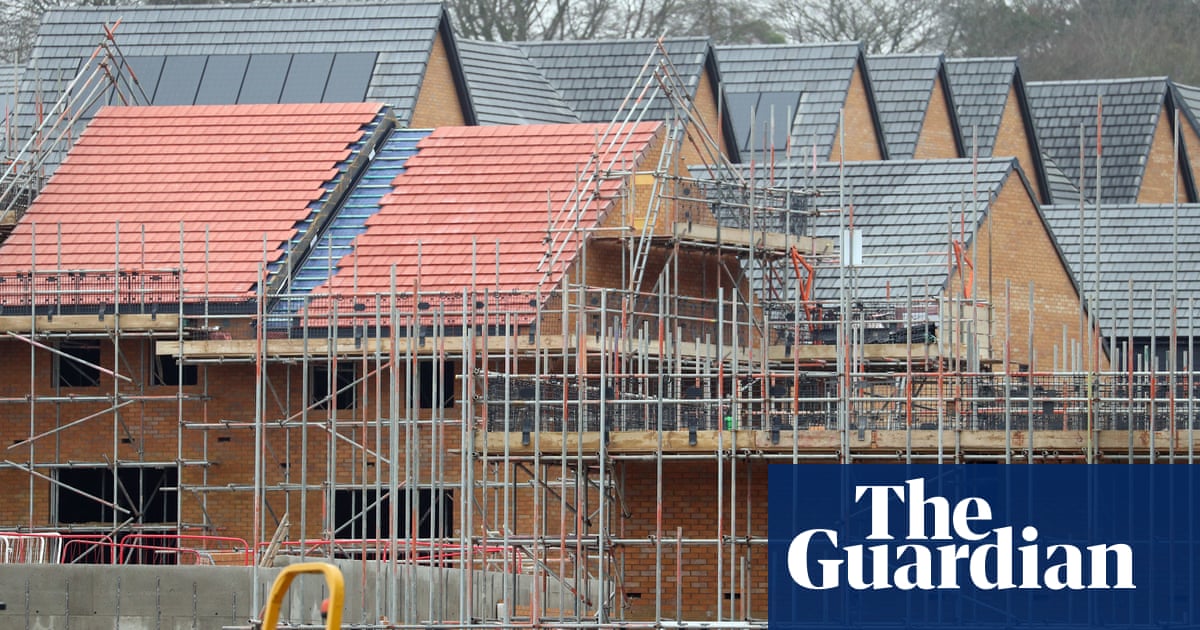
Thousands of new homes are at risk after a series of local authorities cut or delayed their housebuilding plans after ministers decided to drop mandatory building targets.
Nine local authorities in England have paused or scaled back their plans after Michael Gove announced last month that the government would no longer pursue a mandatory target of 300,000 new homes a year, a Guardian analysis has found.
They join nearly 30 other authorities that made similar decisions while they waited for Westminster to make a decision on its targets, with analysts now warning the confusion over housing policy could cost 100,000 new homes over a five-year period.
Matthew Pennycook, the shadow housing minister, said: “The impact of Rishi Sunak and Michael Gove’s reckless decision to signal the end of enforceable housebuilding targets without a viable alternative is already being felt across the country.
“Their weakness in the face of backbench pressure will mean fewer homes built, a deepened housing crisis and a further blow to our economy.”
Gove announced the U-turn in December, three years after the Conservatives included the target in their 2019 manifesto and months after Downing Street said it was “central to our levelling up mission”.
His decision came after months of heavy lobbying from backbench Tory MPs, many of whom believed the party had lost the 2021 Chesham and Amersham byelection as a result of its national planning policies.
As dozens of MPs pushed Sunak to soften or reverse his commitment to the target, a number of local authorities stopped work on their local housebuilding plans, which were meant to be in place by the end of this year.
The planning consultancy Lichfields has calculated that 33 councils have halted or cut their housebuilding plans in the past two years, leaving England with a shortfall of between 50,000 and 100,000 new homes over the next five years.
Many of these authorities were Tory-led councils in rural areas. Dorset, for example, announced last July it was delaying the implementation of its local plan for over two years, a decision which Lichfields estimates will result in 259 fewer homes being built in the county each year.
Others, however, were in more urban areas. In 2021, Sheffield, where Labour is the largest party, announced it would delay its proposals by a year, citing changes to national planning rules. Lichfields calculated that would cost the city more than 700 new houses a year.
Those delays have accelerated since Gove’s announcement last month. In his statement, the housing and levelling up secretary said that not only was he making the national housing target “advisory” rather than “mandatory”, but also that he was reducing the housebuilding requirements on councils in a number of other ways.
Councils would no longer have to plan for 20% more houses than they need, he said, ending a requirement for authorities to include a buffer in their proposals. And those with up-to-date plans would no longer have to maintain enough land supply for the next five years of housing need.
In the five weeks since that announcement, nine authorities have announced they are pausing or shrinking their plans.
They include North Somerset, where the council’s head of planning said last month: “The imposition of housing targets has long been a cause of great frustration for us all … given this latest news from government about changes to the planning system, it will now take longer before we can publish our next draft local plan.”
In Gedling in Nottinghamshire, the Labour deputy leader of the council announced that as a result of the government’s decision the council had abandoned its plans to build on one particular patch of green belt where 360 homes were due to go up.
The housing supply problem might be about to get worse, with several authorities in Greater Manchester now under pressure to withdraw from the region’s plan, known as “Places for Everyone”. That plan, which has been championed by Andy Burnham, the Labour mayor of Greater Manchester, involves building nearly 165,000 new homes in nine local authority areas over five years.
Matthew Spry, a senior director at Lichfields, said: “In the face of the uncertainty over national housing policy, councils – facing staff shortages and tight budgets – have little incentive to invest time, money and political capital in making difficult decisions to plan for new homes.
“The reduced rate of housebuilding that will inevitably follow will have a lasting effect on access to affordable housing and limit the ability of young people to access decent housing.”
Neil Jefferson, the managing director at the Home Builders Federation, said: “The social and economic impacts will be grave as housing affordability worsens, intergenerational inequalities widens and the £20bn cut in economic activity will cost hundreds of thousands of jobs. The short-term political benefits cannot be worth these real-life trade-offs.”












